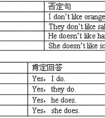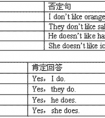用所给动词的正确形式填空。 1. Let's _______ (play) soccer. 2. That _______ (sound) boring. 3. —_______she _______ (have) a phone? —No, she doesn't. 4. -七年级英语
好像他在自言自语。
③能用不定式作表语的系动词有:be, seem, get, look, appear, prove, grow.
Her job is to look after the children.
她的工作是照料孩子们。
He seems not to look after the children.
他好像不是她的父亲。
She looks to be a young girl of twenty year-old.
她看起来像是一个20岁的年轻姑娘。
He didn’t appear to dislike it.
看不出他憎恨此事。
My advice proved to be wrong.
我的建议证明是错误的。
He will grow to like this work gradually.
他会逐渐喜欢这个工作的。
④能与there连用的系动词有:be, appear, seem.
There appeared to be only one room.
那儿好像只有一个房间。
There seems(to be)no need to go.
似乎没有必要走。
6.能用两种否定形式的系动词有两个:seem, appear.
举例说明:
It doesn’t seem that we can get our money back.= It seems that we can’t get our money back.
He seems not to be her father.= He doesn’t seem to be her father.
The baby doesn’t appear to be awake.= The baby appears not to be awake.
7.后接作表语的过去分词可构成系表结构
能构成系表结构的系动词通常有两个:第一个是常见的be(is, am, was等);第二个是get,口语中常用。
当二者作系动词用时,它们均表示一种存在状态,而不表示被动动作;当二者作助动词用时,后接作谓语的过去分词构成被动语态。
Be + P.P常可以用get + P.P.来代替,但是并不是be系动词总是可以用get来代替。Get + P.P.系表结构常用于以下两种情况:
1)表示偶然的、突发性的、意想不到的被动动作的结果或状态。
Last night I got caught in the downpour.昨夜我被雨淋了(表示意想不到)
The new car got scratched.新车给刮坏了。(表突发性)
2)表示对自身所作的事。如get dressed, get lost等。
John got injured while playing football last Saturday.约翰上周星期六踢足球时受了伤。
They got married last month.他们上个月结婚了。
另外,要注意区分系表结构与被动语态结构的用法。
考点名称:助动词的单数第三人称形式
- 助动词的单三形式:
助动词
be
do
have
shall
will
单三形式
is
does
has
shall
will
考点名称:一般疑问句
- 一般疑问句:
是疑问句的一种。通常用yes,no来回答的疑问句叫做一般疑问句。口语中若无特殊含义,句末用升调。
其结构是:系动词be/助动词/情态动词+主语+其他成分?
通常回答为:
肯定:Yes+主语+提问的助动词
否定:No+主语+提问的助动词+not
例如:
Are you from Japan? Yes, I am./No, I'm not.
Do you live near your school? Yes, I do./No, I don't.
Can you speak French? Yes, I can./No, I can't. - 一般疑问句的特性:
1.将陈述句变为一般疑问句时,如句中有be 动词(am/ is/ are)时,可直接将它们提至主语前。
如主语为第一人称,应将其改为第二人称。如:
I'm in Class 2Grade 1. →Are you in Class 2Grade 1﹖
We're watching TV. →Are you watching TV﹖
2.陈述句中有情态动词(can、may、must …)时,也可直接将它们提至主语前,即可成为一般疑问句。如:
He can swim now. →Can he swim now﹖
The children may come with us. → May the children come with us﹖
3.陈述句中只有一个实义动词作谓语且其时态为一般现在时,变为一般疑问句时要在句首加do或does主语后的实义动词用原形。如:
I like these animals. →Do you like these animals﹖
She wants to go to the movies. → Does she want to go to the movies﹖
4.一般疑问句一般读升调(↑)
5.一般疑问句有时不用yes或 no 回答。如:
Are they in town now﹖
I think so.
May I sit here﹖
Certainly.
Does he like soccer﹖
Sorry I don't know.
6. 一般疑问句的第一单词总是虚词,读的时候要读轻声。 - 陈述句变为一般疑问句技巧:
根据一般疑问句不同的家族,可以用不同的方法将陈述句变为相应的一般疑问句。
1、第一家族:含be动词或情态动词的句子
秘诀:一调二改三问号
一调:即把句中的be或情态动词调到主语前;
二改:改换主语称谓,即将句中的主语I\my \mines\we\our\ours等。第一人称分别改为相应的第二人称you\your\ yours等;
三问号:句末的句号改为问号。如:
Eg. I am an English teacher. → Are you an English teacher?
Eg. We can speak English fluently. → Can you speak English fluently?
2、第二家族:含行为动词(或称为实义动词)的句子
秘诀:一加二改三问号
一加:即在句首加助动词Do或Does;
二改:1、把谓语动词改为原形;2、改换主语称谓(同第一家组);
三问号:句末的句号改为问号。
Eg. We read English every morning. → Do you read English every morning?
Eg. Tom’s father listens to English on the radio every evening. →Does Tom’s father listen to English on the radio every evening?
特别注意:对于第二家族一定要注意动词的还原,因为时态与数的变化已经体现在助动词上了。
3、加强记忆口诀:
肯变一,并不难,can 或be提在前;
谓语若为行为动,do 或does句首用。
- 最新内容
- 相关内容
- 网友推荐
- 图文推荐
| [家长教育] 孩子为什么会和父母感情疏离? (2019-07-14) |
| [教师分享] 给远方姐姐的一封信 (2018-11-07) |
| [教师分享] 伸缩门 (2018-11-07) |
| [教师分享] 回家乡 (2018-11-07) |
| [教师分享] 是风味也是人间 (2018-11-07) |
| [教师分享] 一句格言的启示 (2018-11-07) |
| [教师分享] 无规矩不成方圆 (2018-11-07) |
| [教师分享] 第十届全国教育名家论坛有感(二) (2018-11-07) |
| [教师分享] 贪玩的小狗 (2018-11-07) |
| [教师分享] 未命名文章 (2018-11-07) |


![How much does it ______ to fly from Yancheng to Hainan Island?[ ]A. cost B. payC. spend D. take-七年级英语](http://www.00-edu.com/d/file/ks/4/2/shiyidongci/2020-01-05/small7dcf2f05998de63e10cc3629787031c81578210087.png)

![He always _____TV in the evening. He _____ listening to the radio. [ ]A. watch, don't like B. watches, doesn't like C. watching, don't like D. watch, do-七年级英语](http://www.00-edu.com/d/file/ks/4/2/shiyidongci/2020-01-05/small45d599b4a60b84e61cec210bfbf051f51578214524.png)
![I'd rather ___ to the Mcdonald's Restaurant because I like to listen to quiet music.[ ]A. to go B. going C. go D. went-八年级英语](http://www.00-edu.com/d/file/ks/4/2/shiyidongci/2020-01-05/small1767bba1727fef2c035c53dcbd9bc20e1578209517.png)
